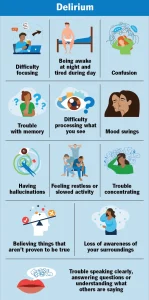Overview
Diagnosis
A healthcare provider can diagnose delirium through a review of medical history, mental status, and possible underlying causes. The evaluation focuses on identifying changes in behavior, thinking, or awareness that developed suddenly.
A diagnosis may include:
-
Medical history – The provider asks about any recent changes such as new infections, medications, pain, injuries, headaches, or substance use (alcohol or drugs).
-
Mental status review – Awareness, attention, and thinking are assessed through conversation or mental status tests. Input from family or caregivers is also considered to understand changes in behavior.
-
Physical and neurological exams – These tests check for physical health issues and neurological function, including vision, balance, coordination, and reflexes, to rule out conditions like stroke.
-
Other tests – Blood and urine tests may be done to detect infections or imbalances. Brain imaging may be used if other tests don’t explain the symptoms.
Treatment
Treatment for delirium focuses on identifying and managing the cause, then providing supportive care to stabilize the patient and promote recovery.
Addressing underlying causes
The first step is to correct what triggered the delirium. This may include:
-
Treating infections
-
Stopping or changing medications that cause confusion
-
Correcting electrolyte imbalances or dehydration
-
Managing pain or other medical issues
Supportive care
Supportive care helps prevent complications and keeps the person safe and comfortable. It includes:
-
Protecting the airway and ensuring adequate breathing
-
Providing proper fluids and nutrition
-
Assisting with mobility and daily activities
-
Managing pain effectively
-
Avoiding unnecessary restraints or bladder tubes
-
Keeping the environment calm and familiar
-
Involving family members or familiar caregivers in daily care
Medications
If delirium is linked to specific medications, the healthcare provider may stop or reduce their use. In some cases, medicines are prescribed to manage severe agitation, confusion, fear, or hallucinations — especially when symptoms:
-
Interfere with treatment or examination
-
Endanger the person or others
-
Do not improve with supportive care
Once symptoms improve, these medicines are usually discontinued or given at lower doses.
Advertisement

